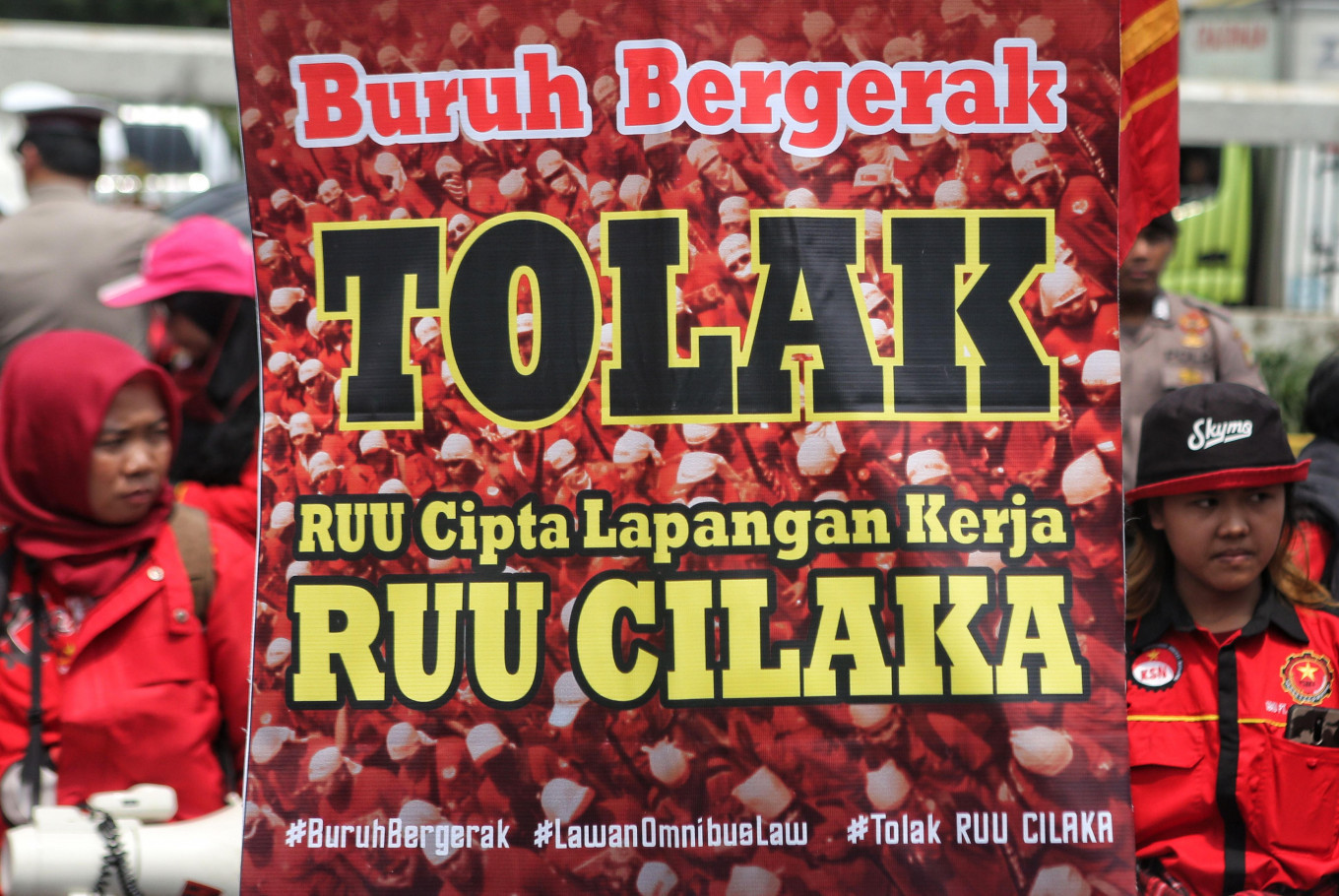Popular Reads
Top Results
Can't find what you're looking for?
View all search resultsPopular Reads
Top Results
Can't find what you're looking for?
View all search resultsManaging investment, trade deficit: Are omnibus laws panacea for growth?
Two omnibus laws on job creation and taxation seem to be Jokowi’s new silver bullets to simplify Indonesia’s jungle of red tape. But are these laws the panaceas we have been looking for?
Change text size
Gift Premium Articles
to Anyone
P
resident Joko “Jokowi” Widodo, has no shortage of problems to blame for the stagnant growth rate of about 5 percent over the last few years. However, there is one problem Jokowi seems to be excessively concerned about: investment.
To be exact, the lack of competitiveness in attracting foreign direct investment (FDI). He often complains about Indonesia's slow investment growth, as the country failed to attract 33 manufacturing firms that relocated from China to Southeast Asia amid the United States-China trade war.
Indonesia's position in the Global Competitiveness Index (GCI) saw a five-place drop last year to 50th out of 141 economies, even with the remarkably stable macroeconomic conditions. The trade wars, the slowdown in China, and the conflict in the Gulf have added to the mix to make the job seem nigh-on impossible.
Despite Jokowi’s efforts to simplify them, complicated regulations seem to be one of the main laggards in Indonesia’s GCI rating. He has complained about a lack of inter-ministerial coordination and a lack of cooperation on the part of local administrations to attract investors.
Two omnibus laws on job creation and taxation seem to be Jokowi’s new silver bullets to simplify Indonesia’s jungle of red tape. But are these laws the panaceas we have been looking for?
There are two points I think very useful in considering about these two laws. Firstly, the laws may take a very long time to be completed. Drafting laws that vast will require the coordination of dozens of ministries and local governments. Note that some articles in these laws may potentially strip power from several ministries and local governments.
Additionally, the job-creation omnibus bill has been facing strong opposition from the labor unions. This is not ideal, especially since the government is desperately trying to revise the Labor Law.
On a positive note, however, the government controls a majority of seats in the House of Representatives.
But past history reminds us how bad we are at enforcing laws. Inconsistency in enforcing over dimension overload (ODOL) for truckers, for example, allows delinquent companies a cost advantage at the expense of compliant firms and other road users in general. The same goes for enforcing environmental regulations.
Moreover, attending to rules such as recommendation letters for imports often takes longer than stated in the regulation, even for firms locating in the free trade economic zones. It is possible the issue with the environmental impact analysis (AMDAL) regulation may actually be an enforcement problem rather than a regulation problem. A level playing field and certainty are very important for businessmen, mainly for those foreign to Indonesian red tape. In the end, a law can only be as good as the institutions enforcing it.
The second problem can be mitigated in at least two ways. One way is, Jokowi should pick the best persons for the enforcing institutions. The two proposed laws possibly will concentrate power in a small number of institutions relative to the status quo. He will need to put highly competent persons in these institutions. If, for some political reason, that way is not feasible, then the laws should be designed to reduce the overall power of the government (by privatizing implementation), giving more control to private institutions. One example is to abolish quota restrictions or the recommendation letter requirement for imports altogether.
Nadiem Makarim, the education minister, has done just this: the Kampus Merdeka (Free Campus) program is essentially decentralization, giving more control to schools and universities, making the ministry somewhat less powerful.
There are good guesses about what the laws are going to look like. They are most likely going to provide fiscal incentives for firms, more centralized (and fewer) permits and less strict labor regulations. Personally, I would love to see fewer trade restrictions, and possibly some incentives for exporters. FDI itself needs to be complemented by increased exports in the medium to long run. For our firms to grow, they need to engage in the global value chain, and compete in the world market. If I am allowed to refer to Nadiem once again, competing with the world is a vision of his, and I think Jokowi’s economic staff need to listen to him.
Alas, it is hard to say what to expect from the omnibus laws. While the President has no significant opposition in the House, the labor unions could potentially be hard to deal with. Moreover, Jokowi has made sure that the public knows he is in a hurry, although that could risk a half-baked drafting. Always hope for the best, but keep a healthy skepticism.
***
PhD student at the Australian National University









